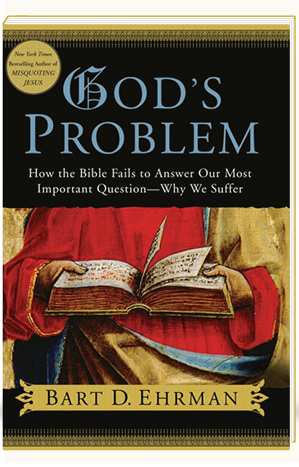
God's Problem: How the Bible Fails to Answer Our Most Important Question - Why We Suffer
By Bart D. Ehrman
Publisher: HarperOne
Publication Date: February 19, 2008
Language: English
ISBN-10: 0061173974
Format: Hardcover, 304pp
Dimensions: 6 x 1.05 x 9 inches
Affiliate Disclaimer: We may earn commissions on products you purchase through this page at no additional cost to you. Thank you for supporting our site!
Editorial Review From the Publisher
In times of questioning and despair, people often quote the Bible to provide answers. Surprisingly, though, the Bible does not have one answer but many “answers” that often contradict one another. Consider these competing explanations for suffering put forth by various biblical writers: The prophets: suffering is a punishment for sin. The book of Job, which offers two different answers: suffering is a test, and you will be rewarded later for passing it; and suffering is beyond comprehension, since we are just human beings and God, after all, is God. Ecclesiastes: suffering is the nature of things, so just accept it. All apocalyptic texts in both the Hebrew Bible and the New Testament: God will eventually make right all that is wrong with the world. For renowned Bible scholar Bart Ehrman, the question of why there is so much suffering in the world is more than a haunting thought. Ehrman’s inability to reconcile the claims of faith with the facts of real life led the former pastor of the Princeton Baptist Church to reject Christianity. In God’s Problem, Ehrman discusses his personal anguish upon discovering the Bible’s contradictory explanations for suffering and invites all people of faith–or no faith–to confront their deepest questions about how God engages the world
Darby Orcutt – Library Journal
This serious book by a serious scholar will be talked about and cannot be ignored by any collection. Ehrman (religious studies, Univ. of North Carolina at Chapel Hill; Misquoting Jesus: The Story Behind Who Changed the Bible and Why) is a New York Times best-selling author and a familiar media figure in the scholarly discussion of the New Testament. Here, he turns from his usual historical-critical concerns to theological consideration of the problem of suffering: namely, if God is all-powerful and all-loving, how can suffering exist? Ehrman writes in a clear and engaging style, bringing personal reflection and reason to bear on academically sound readings of biblical perspectives on suffering, from both the Old and the New Testament. Ultimately, the book is a very personal statement that will anger some and resonate with others; most important, it will provoke mature consideration of this very important question. For all libraries.

